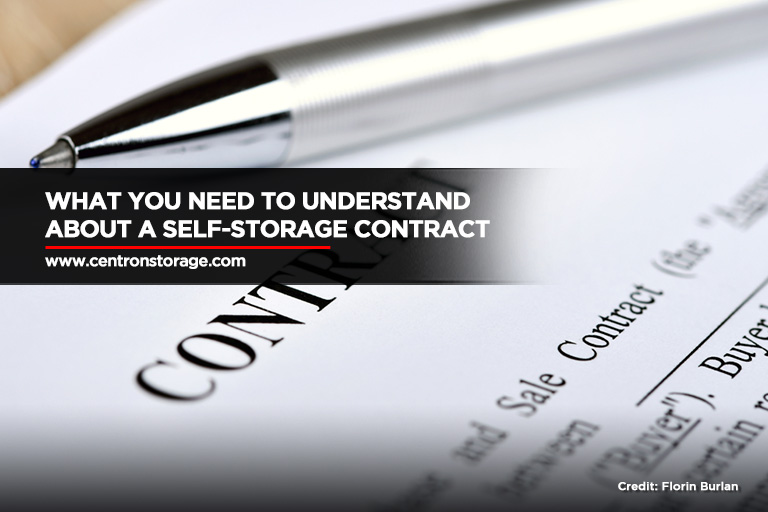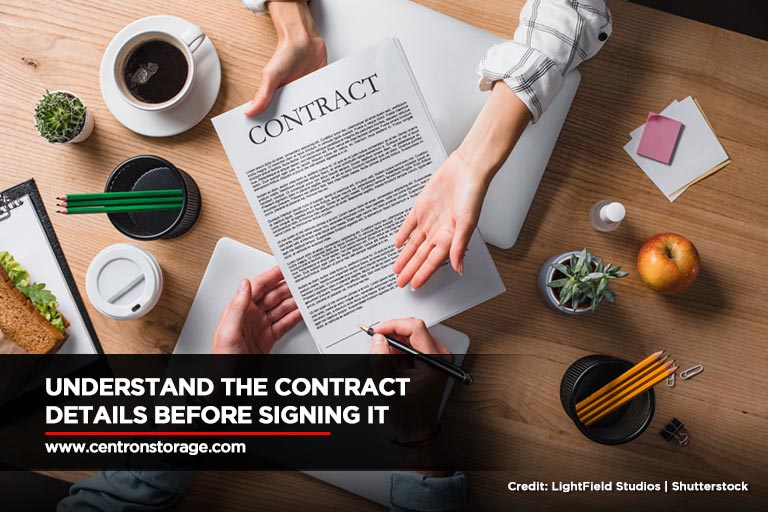What You Need to Understand About a Self-Storage Contract

Self-storage facilities offer cost-effective short-term or long-term storage solutions you can use to keep unused belongings. If you are planning to rent a storage unit, you will need to sign a self-storage contract.
Most self-storage companies provide a contract that outlines important conditions and agreement details for both parties. This allows you and the company to avoid any form of miscommunications and conflicts. However, contracts can be fairly complex. While some map out their terms and conditions in a simple and easy-to-understand manner, others might leave you at a loss.
Before signing on the dotted line, it is a good idea to read and make sense of the terms and conditions of the lease agreement for storage space.
What Terms Are Included in a Self Storage Rental Agreement?
A storage facility contract or agreement should clearly and carefully lay out the arrangement between the tenant and the self-storage owner. It contains essential key points, such as the contact details, unit purpose, terms, and payment information. The contract should also list the address and phone number(s), and email address of the storage facility and the client. The terms of the lease agreement should also include the start and the end date of the rental. For instance, the customer may sign up for a 1-year rental or the contract runs on a month-to-month basis. The unit purpose contains all the listed items stored within the storage space, such as personal items and non-perishable property.
Key Elements of a Self-Storage Contract

When renting a storage unit, it is crucial to thoroughly go through the contract and understand its content. Since the contract serves as a legal agreement between the renter and the facility, make sure it contains all the important details.
However, every contract is unique and terms and conditions will vary. Here are a few essential points and legal definitions that will help you navigate its content like a pro.
- Financial Details
Every self-storage contract provides an outline of the monthly payment due, describing how payments are accepted, such as by credit card, check, or online means. The following information can be found in the contract:
-
- Due date of monthly rent and various forms of payment accepted
- The required amount of deposit
- When is the payment considered late
- Fees collected for delayed payments, lock cuts, auctions to recover money owned and other fees.
- Actions taken by the facility if the tenant fails to continue payments
- Use of Unit
Every self-storage facility has its own unique set of rules and regulations that outline what the lessee can do or cannot do with their storage space. This may include:
-
- A list of items that are not allowed in the storage unit
- The maximum value of items allowed in the storage space
- Keeping the unit clean and in good condition
- Using a drip pan to keep the fluid from staining the floor when storing a vehicle
Also found in the contract are the penalties incurred if the renter disobeys the rules. In most cases, it can be an additional charge or a possible eviction.
- Notices
Certain situations call for the tenant to provide notice to the storage facility manager. The information must include:
-
- Change of contact information, such as phone number and address
- The specific number of days in which the landlord must be notified before moving out
Since most contracts are on a month-to-month basis, the contract may automatically renew if the tenant failed to provide notice of moving out.
- Landlord’s Rights
Just as you have certain rights and responsibilities as a lessee, so does the storage facility landlord. However, there are things that you can and cannot do, and the rules should outline them clearly in the contract.
-
- Make necessary repairs
- Understand the conditions that give the landlord the right to lock you out of the unit and what steps to take to regain access
Common Legal Terms and Definitions

The contract may use several legal terminologies that you might not understand. Below are the definitions of the most common jargon that will help you make sense of the contract.
- Lien on Personal Property
A lien means that if you fail to pay your monthly self-storage fee, the facility manager will have the right to put your stored items on sale at a storage auction.
- Release of Liability Waiver
Most contracts will ask the renter to agree to a waiver stating that the facility landlord will not be responsible if your get injured at the facility or for your damaged belongings. For example, getting your hand stuck and injured in the door. The self-storage personnel will not at any cost be liable for your injury.
- Indemnification
This term means that when the lessee does something that results in a claim against the storage facility, they or their insurance provider will have to defend and pay the judgments against the facility. For instance, if a tenant picking up items from their unit accidentally backs their vehicle into another tenant, resulting in an injury, and if the injured party files a legal suit against the party at fault and the facility, under indemnification, the party at fault will have to pay both claims.
- Breach
A breach refers to the violation of any terms in the contract. The most common example of a breach is when a tenant decides to discontinue paying their rent or is living in the storage space.
- Exclusion of Warranties
This clause implies that in the event that the lessee is unsatisfied with the rented space after signing the contract, the facility manager will not be held responsible for it. Be sure to check the storage space personally before you sign the contract.
Most self-storage contracts are generally not confusing. If you happen to come across complex terms, it is your responsibility to understand them. Before you affix your signature on the contract, make sure to review the terms and conditions with the facility manager. Do not hesitate to ask questions to make sure that all details of your rental contract are clearly understood.
At Centron Self Storage, we have friendly and knowledgeable staff members who are ready to assist you. We will be glad to help you understand the process and paperwork before signing the contract. Call us at (416) 739-0000 for your friendly neighbourhood storage rental in North York.

